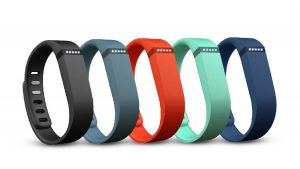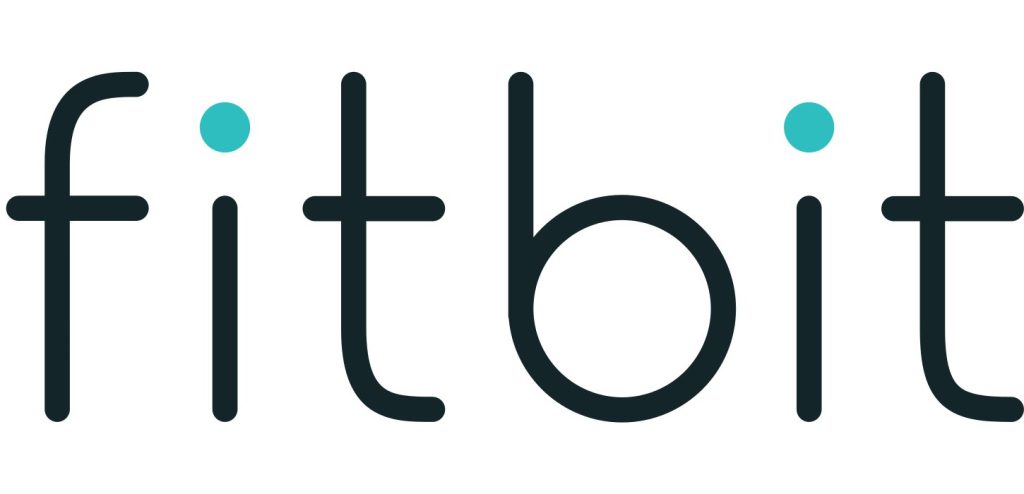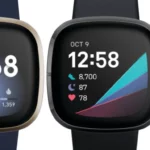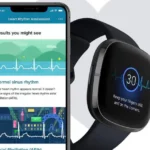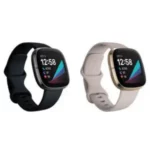The Fitbit Flex is packed full of amazing technology, especially for such a small device. You can find out how to correctly attach the device to your wrist as well as sync it with your dashboard and devices.
Sections in this Manual
- Getting Started
- Putting on your Fitbit Flex
- Setting up your Fitbit Flex
- Syncing your tracker data to your Fitbit account
- Getting to know your Fitbit Flex
- Charging your Flex
- Care
- Tracking with Fitbit Flex
- Using your fitbit.com Dashboard
- Updating your Fitbit Flex
- Troubleshooting your Flex
- General Info & Specifications
- Help
- Safety Statement
- Disposal and recycling information

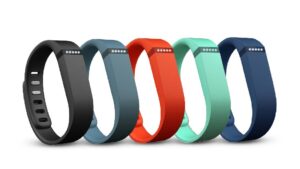
User Manual Version 1.1
Getting Started
Welcome to the Fitbit Flex™ Wireless Activity + Sleep Wristband.
What’s in the box
Your Flex box includes:
- Flex tracker
- Charging cable
- Wireless sync dongle
- 1 small and 1 large wristband
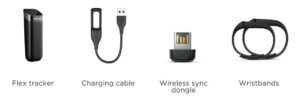
What’s in this document
This manual gets you started quickly getting your tracker on your wrist then setting it up. Setup ensures that your tracker can synchronize its data with fitbit.com or the
Fitbit app, where you can get detailed information on your stats, view historical trends, log food, and much more. As soon as setup is complete you’re ready to start moving.
The remainder of the manual walks you through every function on your Flex and also explains how to keep your tracker up to date with free firmware updates. Throughout the manual you’ll notice that for tasks that can be done on the fitbit.com dashboard or the Fitbit app, only the fitbit.com instructions appear—if you have the Fitbit app for iOS, Android, or Windows, you can easily find instructions in our articles at https://help.fitbit.com.
The manual concludes by explaining how to restart your Flex in the event you encounter difficulty with your tracker. All other troubleshooting suggestions, as well as detailed information about how Fitbit trackers and services work, can be found in the articles at https://help.fitbit.com
Putting on your Fitbit Flex
Your Flex comes with a large and a small wristband. If you want to use the small wristband, complete the next task before continuing. If you want to use the large wristband, skip the next task and go directly to Inserting the tracker into the wristband.
Moving the clasp from the large to small wristband
If you choose the small wristband, you’ll need to remove the clasp from the large wristband and put it into the small wristband. To do so:
- Push the clasp out with one thumb from the inside of the wristband.
- Pull out the clasp.
- Insert the clasp into the small wristband by pressing a few times with both thumbs to ensure that the clasp is flat and in line with the wristband.
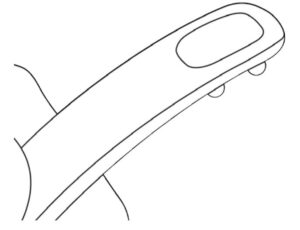
NOTE: If there is a bulge on the inside of the band between the two inside prongs of the clasp, find a small object like a credit card to push it flat.
Inserting the tracker into the wristband
Hold the tracker in your hand with the grey arrow facing up. Insert this end into the wristband, with the arrow pointing toward the holes in the wristband.
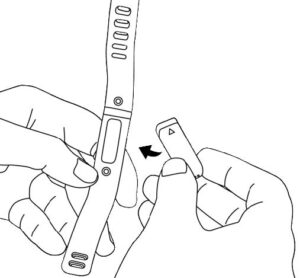
Securing your wristband
- Put on the wristband so the window of lights are closest to the outside of your wrist and facing you.
- Align both ends of the wristband so they are directly overlapping each other with the clasp over the two holes that best fit your wrist.
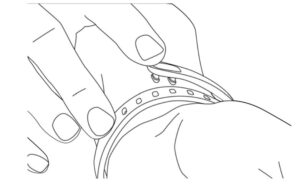
- Squeeze both the clasp and the wristband between your thumb and forefinger until you hear a click.
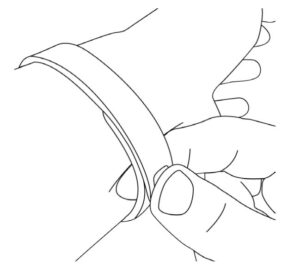
- You’ll know your Flex wristband is securely fastened if both ends of the wristband are fully inserted.

NOTE: If you’re having trouble, try securing the wristband off your wrist to get a feel for how it securely clasps and then try again on your wrist.
Setting up your Fitbit Flex
You can set up your Flex using a computer or the Fitbit apps for iOS, Android, or Windows.
Setting up your tracker on your mobile device
The Fitbit app is compatible with more than 200 mobile devices that support iOS, Android, and Windows 10 operating systems.
To get started:
- Make sure the Fitbit app is compatible with your mobile device by checking http://www.fitbit.com/devices
- Find the Fitbit app in one of these locations, depending on your device:
• The Apple® App Store® for iOS devices such as an iPhone® or iPad®.
• The Google Play™ Store for Android devices such as the Samsung® Galaxy® S5 and Motorola Droid Turbo.
• The Microsoft® Windows Store for Windows 10 mobile devices such as the Lumia™ phone or Surface™ tablet. - Install the app. Note that you’ll need an account with the applicable store before you can download even a free app such as Fitbit.
- When the app is installed, open it and tap Join Fitbit to get started. You’ll be guided through the process of creating a Fitbit account and connecting (pairing) your Flex to your mobile device. Pairing makes sure the tracker and mobile device can communicate with one another (sync their data).
Note that the personal information you’re asked during setup is used to calculate your basal metabolic rate (BMR), which helps determine your estimated calorie expenditure. This information is private unless you go into your Privacy settings and opt to share age, height, or weight with Fitbit friends.
After setup you’re ready to get moving.
Setting up your tracker on your Windows 10 PC
If you don’t have a mobile device, you can set up and sync your tracker on your Windows 10 PC using the same Fitbit app available for Windows mobile devices.
To get the app, click the Start button and open the Windows Store (called Store). Search for “Fitbit app.” Note that if you’ve never downloaded an app from the store to your computer, you’ll be prompted to create an account.
Open the app and follow the instructions to create a Fitbit account and set up your Flex. You can set up and sync wirelessly if your computer has Bluetooth®, otherwise you’ll need to use the wireless sync dongle that came in the box with your Fitbit Flex.
Setting up your tracker on your Mac
If you don’t have a compatible mobile device, you can set up your tracker with a computer and see your Fitbit stats on fitbit.com. To use this setup method you’ll first install a free software application called Fitbit Connect that lets Flex sync its data with your fitbit.com dashboard.
To install Fitbit Connect and set up your tracker:
- Go to http://www.fitbit.com/setup
- Scroll down and click the option to download. If the button does not correctly show your type of computer (for example, if it says “Download for Mac”), choose the correct type, then click the button.
- When prompted, save the file that appears.
- Double-click the file (Install Fitbit Connect.pkg). The Fitbit Connect installer opens.
- Click Continue to move through the installer.
- When prompted, choose Set up a New Fitbit Device.
- Follow the onscreen instructions to create a Fitbit account and connect your Flex.
Note that the personal information you’re asked during setup is used to calculate your basal metabolic rate (BMR), which helps determine your estimated calorie expenditure. This information is private unless you go into your Privacy settings and opt to share age, height, or weight with Fitbit friends.
Syncing your tracker data to your Fitbit account
Once you’ve set up and started using Flex, you’ll need to make sure it regularly transfers (syncs) its data to Fitbit so you can track your progress, see your exercise history, earn badges, analyze your sleep logs, and more on your Fitbit dashboard. A daily sync is recommended but not required.
The Fitbit apps use Bluetooth Low Energy (BLE) technology to sync with your Fitbit tracker. Each time you open the app it will sync if the tracker is nearby, and the app will also sync periodically throughout the day if you have the all-day sync setting enabled. If you’re running the Fitbit app on a Windows 10 PC that doesn’t have Bluetooth, you’ll need to make sure the tracker is connected to the computer.
Fitbit Connect on a Mac® also uses Bluetooth for syncing (if available), otherwise you’ll need to make sure your wireless sync dongle is plugged into the computer. You can force Fitbit Connect to sync at any time or it will happen automatically every 15 minutes if:
- The tracker is within 20 feet of your computer.
- The computer is powered on, awake, and connected to the Internet.
Getting to know your Fitbit Flex
This section tells you how best to wear, charge, and care for your tracker. Your Flex is designed to be most accurate when worn on your wrist.
Wearing on your dominant vs. non-dominant wrist
To get the most accurate reading from your Flex, make sure your account knows if you’re wearing the wristband on your dominant or non-dominant wrist. Your dominant wrist refers to handedness, that is, the hand that you use for activities such as writing and throwing a ball.
To configure this setting:
- Log in to fitbit.com and click the gear icon in the top-right corner.
- Click Settings > Devices.
- Under Dominant Hand choose the correct setting.
- Sync your tracker to save the change:
a. Click the Fitbit Connect icon near the date and time on your computer.
b. Click Sync Now.
Using your Flex in wet conditions
Your Flex is water-resistant, which means it is rain-proof and splash-proof and can stand up to even the sweatiest workout.
Do not swim with your Flex. We also don’t recommend showering with your Flex; though the water won’t hurt the device, wearing it 24/7 does not give your skin a chance to breathe. Whenever you get your Flex wet, dry it thoroughly before putting it back on.
Understanding the LED indicator lights
Your Flex has 5 LED indicator lights. The lights behave differently depending on what the tracker is doing.
Goal tracking
The indicator lights illuminate as you hit 20% increments towards your goal. Tap your Flex to see your progress. When you reach your goal, Flex will celebrate by buzzing and flashing its lights.
Sleep mode
When you tap your Flex rapidly for one or two seconds to manually enter sleep mode, it will vibrate and display two slowly dimming lights. During manual sleep
mode, two blinking lights alternate. After you tap your Flex rapidly to exit manual sleep mode, it will vibrate and flash all five lights three times and then display a spinning light pattern.
These light patterns only apply to manual sleep mode. If you let Flex detect your sleep automatically, no special light patterns appear.
Charging
While your Flex is charging, an indicator light will pulse to show the battery level every few seconds. Each indicator light represents progress towards the total charge. When the Flex has charged completely, all 5 indicator lights will blink.
Updating
If an update fails to complete, your Flex’s LED indicator lights may cycle back and forth repeatedly, from left to right, and your Flex no may longer respond to taps, charging, or resets.
Alarms
When a silent alarm goes off, the Flex vibrates and the center light flashes.
Charging your Flex
With normal use, your Flex should last up to five days before needing a charge. You can check the level of your battery by logging in to fitbit.com and clicking on the gear icon on the top-right corner of the page.
To charge your Flex, plug the charging cable into the USB port on your computer. Remove the tracker from the wristband, and insert it into the charging cable, with the LED indicator lights facing up.
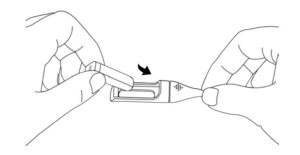
The LED indicator lights will progressively illuminate on your Flex as it charges. Each light represents 20% of the maximum charge. Once all five lights pulse in unison, your Flex will be fully charged. Charging completely can take up to three hours.
Care
It’s important to clean and dry your Flex regularly. For instructions and more information see http://www.fitbit.com/productcare
Tracking with Fitbit Flex
Your Flex tracks:
- Steps taken
- Calories burned
- Distance traveled
- Active minutes
- Time asleep
- Quality of sleep
- Number of times awoken
Setting goals
Your Flex is designed to track your progress towards the fitness goal you choose. Goals can be set for steps taken, calories burned, or distance traveled.
To choose the specific goal you want to track:
- Log in to your fitbit.com dashboard and click the gear icon in the top right
corner. - Click Settings > Devices.
- Under Daily Goal Progress, choose the goal you would like to track.
- Sync your Flex to send the new goal to your tracker.
Note: Your Flex starts tracking your goal for the next day at midnight, according to the time zone you’ve selected for your account. The reset that occurs at midnight does not delete the previous day’s data; all your data will appear on your dashboard when you sync your tracker.
Once you’ve chosen which goal you want to track, you can set a specific value for that goal on the fitbit.com dashboard page or using the Fitbit app. For example, instead of the default 10,000 steps per day, you may want your goal to be 15,000 per day. To change your goal value using your fitbit.com dashboard:
- Find the tile that corresponds to your goal.
- Click the gear icon in the lower left corner of the tile.
- Change your Daily Goal value.
Checking your goal progress
Tap your Flex twice to see the LED indicator lights indicate your progress towards your goal.
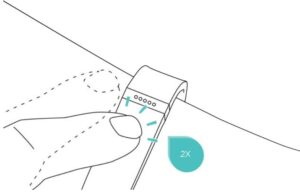
Each fully lit indicator represents 20% of your total goal. A blinking light shows the current segment of the goal you’re working on.
In the example below, two lights are solid and the third is blinking. This means you’ve achieved between 40% and 60% of your overall goal.
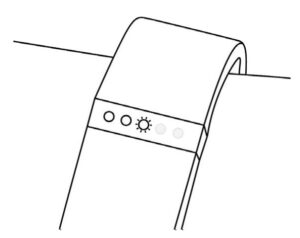
When you reach your goal, your Flex will vibrate and flash the LED indicator lights to celebrate.
Tracking sleep
Your Flex can track the length and quality of your sleep to help you improve your sleeping habits.
To track your sleep, simply wear your Flex to bed. When your tracker syncs with your account in the morning, you’ll be able to find your sleep data on your Fitbit dashboard.
If you want to see the time it takes you to fall asleep, you can use manual sleep mode instead of tracking sleep automatically. To put your tracker into sleep mode, tap your Flex rapidly for one to two seconds. It will vibrate and display two slowly dimming lights. During the night you’ll see alternating blinking lights that represent sleep mode. When you wake up, tap your Flex rapidly for one to two seconds to turn off sleep mode. Your Flex will vibrate and flash all five LED indicator lights to let you know sleep mode is off.
Using silent alarms
Your Flex can gently vibrate to wake or alert you with its silent alarm feature. Silent alarms can be configured to recur every day or on particular days of the week. You can create up to 8 silent alarms.
Setting silent alarms
You can add, edit, and delete silent alarms from the Fitbit app or in the fitbit.com dashboard.
To set silent alarms using your fitbit.com dashboard:
- Log in to your fitbit.com dashboard.
- Click the gear icon in the top right corner of the page.
- Click Settings.
- Find Silent Alarms and click the Add Alarm button.
- Enter the time you want the alarm to alert you.
- Choose how often you want the alarm to occur:
a. Once – Your alarm will alert you at the specified time, and not repeat.
b. Repeats – Choose which days you want this alarm to repeat every week. - Click Save.
- Sync your Flex to update your tracker with the new alarms.
Dismissing silent alarms
Your Flex will vibrate and the LEDs will illuminate when your silent alarm goes off. This notification will repeat three times or until dismissed. You can dismiss the alarm by tapping a few times after the vibration has stopped.
You’ll know your alarm has been dismissed when one light appears in the middle of your Flex’s display, then slowly fades. If you do not dismiss the alarm, your Flex alarm will repeat in nine minutes.
Using your fitbit.com Dashboard
Fitbit provides a free online tool — the fitbit.com dashboard — to help you track, manage, and evaluate your fitness progress. Use the dashboard to see your progress towards goals, analyze details about specific activities or exercises, view historical graphs, and log food.
Browser requirements
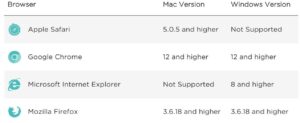
Adding and removing tiles
Information on the dashboard is organized by tile. Add or remove tiles to customize the dashboard. If you remove a tile, you can add it back at any time.
To add a tile:
- Click the grid icon on the upper left side of the dashboard.
- Check the tile(s) you want to add, then click Done.
To delete a tile:
- Hover over a tile until you see the gear icon at the lower left.
- Click the gear icon, then click Remove Tile.
- When prompted, confirm that you want to remove the tile.
Managing your Flex from fitbit.com
To manage various settings for your account, click the gear icon in the top right corner of your fitbit.com dashboard and select Settings. From here you can edit your personal information, your notification preferences, your privacy settings, and much more.
Click Devices to change the following settings for your Flex:
- Daily Goal Progress: Choose which goal you want your Flex to display when
checking your progress. You can edit the value of this goal from the fitbit.com
dashboard. - Dominant Hand: Choose which wrist you wear your Flex on to get the most
accurate data readings. - Sleep Tracking: Set the sensitivity of your sleep. The Normal setting is sufficient for most people. If you are a sound sleeper, you can choose Sensitive
to capture the smallest movements of your body.
Your changes will take effect after you sync your tracker.
Updating your Fitbit Flex
Free feature enhancements and product improvements may be made available for your Flex through firmware updates.
Updating the firmware on your Flex takes several minutes and is demanding on the battery. We recommend that you charge your device before updating or while the update is in progress.
You can update your Flex by using the Fitbit app or by using Fitbit Connect on your computer.
To update your Flex using Fitbit Connect:
- Plug in your dongle and have your tracker nearby, turned on, and charged.
- Open Fitbit Connect.
- Click Open Main Menu, and then click Check for device update.
- Log in to your account using your fitbit.com credentials. Fitbit Connect will now look for your Flex. You can make Flex easier to find by tapping it twice to wake it up.
- If an update is found for your Flex, Fitbit Connect displays a progress bar indicating that the update is in progress. Keep your Flex close to your computer during the update.
You’ll see a notification when the update completes.
Troubleshooting your Flex
If you experience one of the following problems, it may be fixed by restarting your tracker:
- Your Flex is not syncing
- Your Flex is not responding to movement
- Your Flex isn’t tracking your steps
- Your Flex isn’t responding to taps
To restart your Flex:
- Remove the tracker from the wristband.
- Plug your charging cable into the USB port and insert your tracker into the
charging cable. - Insert a paperclip into the small pinhole on the back of the charger.
- Press on the pinhole for 3-4 seconds. Your Flex will restart and you can put it
back in the wristband.
Your Flex should now work normally.
For additional troubleshooting suggestions or to contact Customer Support, see http://help.fitbit.com
General Info and Specifications
Sensors and motors
Your Flex uses a MEMS 3-axis accelerometer that measures your motion patterns to determine your calories burned, distance traveled, steps taken, and sleep quality. Flex also contains a vibration motor, which allows it to vibrate when alarms go off.
Battery
Your Flex comes equipped with a rechargeable lithium-polymer battery.
Size and weight

Environmental conditions
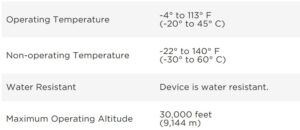
Help
Troubleshooting and assistance for your Flex can be found at http://help.fitbit.com
Return policy and warranty
Warranty information and the fitbit.com Store Return Policy can be found online at http://www.fitbit.com/returns
Regulatory and Safety Notices
Model Name: FB401
USA: Federal Communications Commission (FCC) statement
This device complies with FCC part 15 FCC Rules. Operation is subject to the following two conditions:
- This device may not cause harmful interference and
- This device must accept any interference, including interference that may
cause undesired operation of the device.
FCC Warning
Changes or modifications not expressly approved by the party responsible for compliance could void the user’s authority to operate the equipment.
Note: This equipment has been tested and found to comply with the limits for a Class B digital device, pursuant to part 15 of the FCC Rules. These limits are designed to provide reasonable protection against harmful interference in a residential installation.
This equipment generates, uses and can radiate radio frequency energy and, if not installed and used in accordance with the instructions, may cause harmful interference to radio communications.
However, there is no guarantee that interference will not occur in a particular installation. If this equipment does cause harmful interference to radio or television reception, which can be determined by turning the equipment off and on, the user is encouraged to try to correct the interference by one or more of the following measures:
- Reorient or relocate the receiving antenna.
- Increase the separation between the equipment and receiver.
- Connect the equipment into an outlet on a circuit different from that to which the receiver is connected.
- Consult the dealer or an experienced radio/TV technician for help.
This device meets the FCC and IC requirements for RF exposure in public or uncontrolled environments.
Canada: Industry Canada (IC) statement
IC Notice to Users English/French in accordance with RSS GEN Issue 3: This device complies with Industry Canada license exempt RSS standard(s). Operation is subject to the following two conditions:
- This device may not cause interference, and
- This device must accept any interference, including interference that may cause undesired operation of the device.
This Class B digital apparatus complies with Canadian ICES-003.
FCC ID XRAFB401
IC ID 8542A-FB401
European Union (EU)
Simplified EU Declaration of Conformity
Hereby, Fitbit, Inc. declares that the radio equipment type Model FB401 is in compliance with Directive 2014/53/EU. The full text of the EU declaration of conformity is available at the following internet address: http://www.fitbit.com/safety

United Arab Emirates
TRA REGISTERED NO:
ER35025/14
DEALER NO:
DA35294/14
Safety Statement
This equipment has been tested to comply with safety certification in accordance with the specifications of EN Standard: EN60950-1:2006 + A11:2009 + A1:2010 + A12: 2011, + A2:2013.
Important safety instructions
- Read these instructions.
- Keep these instructions.
- Heed all warnings
- Follow all instructions
- Do not attempt to open the tracker. Substances contained in this product and/or its battery may damage the environment and/or human health if handled and disposed of improperly.
- Do not tamper with your Flex.
- Do not use abrasive cleaners to clean your Flex.
- Do not place your Flex in a dishwasher, washing machine or dryer.
- Do not expose your Flex to extremely high or low temperatures.
- Do not use your Flex in a sauna or steam room.
- Do not leave your Flex in direct sunlight for an extended period of time.
- Do not leave your Flex near open flames.
- Do not dispose of your Flex in a fire. The battery could explode.
- Do not attempt to disassemble your Flex. It does not contain serviceable components.
- Never allow children to play with the Flex; the small components may be a choking hazard!
Built-in battery precautions
- Do not attempt to replace your Flex’ battery. It is built-in and not changeable.
- Charge the battery in accordance with the instructions supplied with this guide.
- Use only the charger that shipped with your product to charge the battery.
- Charge your Flex using a certified computer, powered hub or power supply
- Do not attempt to force open the built-in battery.
- Your product uses a California Energy Commission battery charger.
Disposal and recycling information
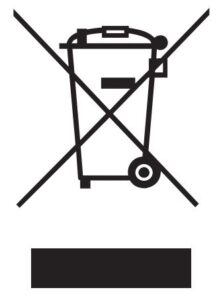
The symbol on the product or its packaging signifies that this product has to be disposed separately from ordinary household wastes at its end of life. Please kindly be aware that this is your responsibility to dispose electronic equipment at recycling centers so as to help conserve natural resources. Each country in the European Union should have its collection centers for electrical and electronic equipment recycling.
For information about your recycling drop off point, please contact your local electrical and electronic equipment waste management authority or the retailer where you bought the product.
- Do not dispose of the Flex with household waste.
- Batteries are not to be disposed of in municipal waste stream and require separate collection.
- Disposal of the packaging and your Flex should be done in accordance with local regulations.

